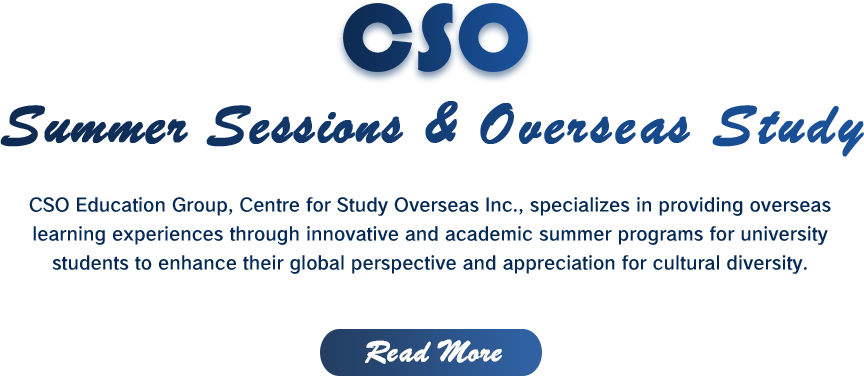
Application steps
Application Form
Pay the Application Fee
Consultation & Scholarships
Course Selection
Submit Letter of Permission (LOP)
Pay Tuition
Prepare for Travel
Fill out an Application Form
Once your application fee is processed, our team will be in touch regarding next steps.
Upon delivery of the application fee, our staff will assess your eligibility for scholarships.
Our student service representatives will advise you on course selection.
Once approved, the LOP must be submitted to your university’s Registrar’s Office.
Tuition rates differ depending on the program and number of courses taken.
Visa, accommodations and insurance where applicable.
CAD(E-Transfer)
| finance@canadasummer.ca | |
|---|---|
| Information to Include | Student Name – University Name |
| Password | CSOCSO |
We believe students should have the opportunity to study abroad at affordable rates. In line with this mission, every student who applies for and is accepted into a CSO summer program is eligible to receive a scholarship valued up to $1200. Scholarships are awarded as a discount applied to program tuition fees. Eligible students will automatically receive the applicable scholarship and are not required to submit a scholarship application unless specified otherwise.
Eligibility Requirements:
• Student must be in good academic standing as demonstrated by a GPA score of 2.3/4.0 (60% or higher)
• No prior academic record/offence
• Currently pursuing an undergraduate degree
Students are strongly encouraged to apply as early as possible for summer programs in order to guarantee a higher scholarship award.
Additional scholarships are available for students attending summer programs at designated partner institutions. Consult with an academic advisor to learn more about eligibility and the scholarship application process.
![]() Orientation
Orientation
Orientation will be held for all Summer Session students on the day prior to the program’s start date. This will be your chance to meet your professors, interact with fellow classmates, and become more familiar with the campus!
![]() What's Included
What's Included
We understand that travelling to a new country can be somewhat intimidating. To help with this, CSO sends staff abroad to accompany students at each destination. Staff members will provide 24/7 on-site support and assistance as needed.
![]() Accommodations
Accommodations
Most campus destinations provide students with residence or off-campus housing options. In any case, we will assist you with arranging your accommodations abroad and ensure you are located within commuting distance of your campus.
![]() Visa & Insurance
Visa & Insurance
Our staff will assist you in obtaining the appropriate documentation for a student visa as required by certain destinations. We will also provide you with travelling insurance that covers accidents, illnesses, or injuries while abroad.
![]() Program Events & Activities
Program Events & Activities
Outside of class hours, students will have the opportunity to participate in various fun events and activities organized by CSO staff members that are designed to enhance learning, encourage new friendships, and enrich the student experience of local culture.
![]() Public Transportation Card
Public Transportation Card
CSO will provide each student with a reloadable transportation card that will allow students to get around the city with ease using various modes of public transportation, including the local subway and city buses.
![]() Credit Transfer
Credit Transfer
Our student service staff members will provide ongoing support and course consultations as they assist each student with submitting a Letter of Permission (LOP) to their home university ensuring successful credit transfer.
![]() Transcript
Transcript
Given the successful completion of summer courses, students will receive an official transcript from the host university which will be sent directly to their home university. Official transcripts will remain accessible to students for a period of 3 years upon program completion for those looking to request a copy for future use.
![]() Academic Support
Academic Support
CSO recruits numerous Master’s and PhD-level students to become Teaching Assistants (TAs) for summer courses abroad. In addition to the office hours provided by your course professors, you can expect supplementary academic support from your TAs.